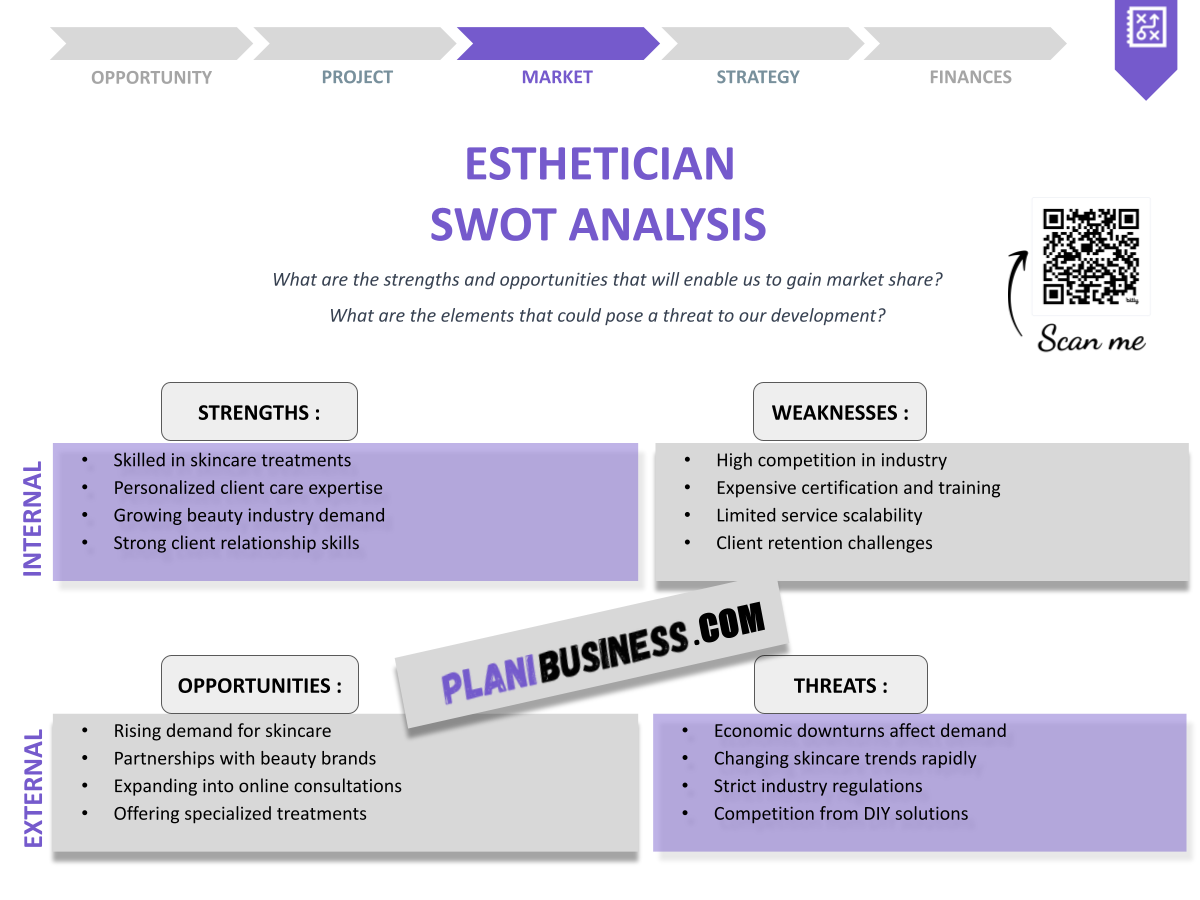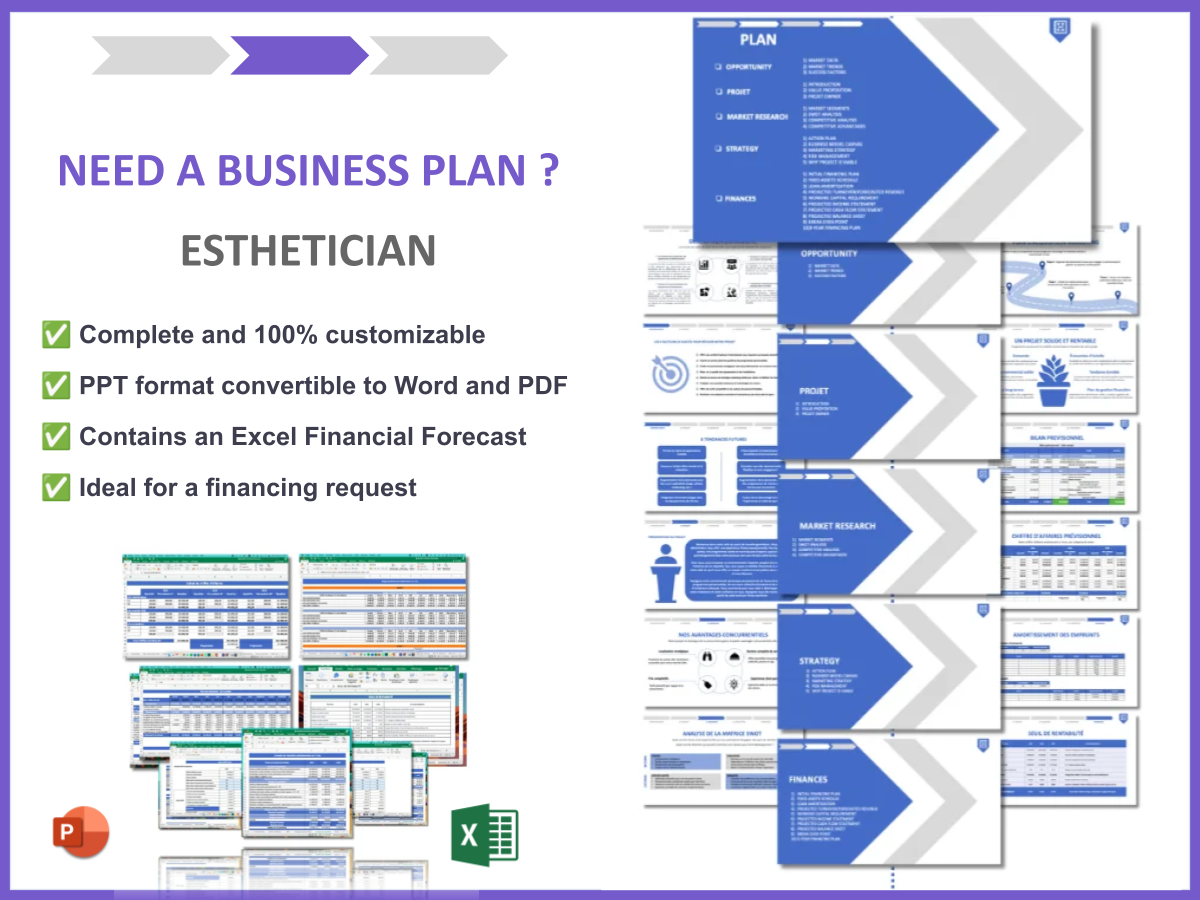Why Should You Have a SWOT Analysis for Your Esthetician Business?
Are you thinking about launching an esthetician business? You’re not alone! The beauty industry is booming, and aspiring estheticians are eager to carve out their niche. But did you know that nearly 60% of new beauty businesses fail within the first three years? That’s a staggering statistic that emphasizes the importance of strategic planning.
A SWOT analysis can be a game-changer in ensuring your business thrives. This tool helps you evaluate your Strengths, Weaknesses, Opportunities, and Threats, giving you a clear understanding of where you stand in the competitive beauty landscape.
In essence, a SWOT analysis is a structured planning method that can help you identify internal and external factors affecting your business. It’s a roadmap that can guide your decisions and strategies.
Here’s a quick list of what this article will cover:
- Importance of SWOT analysis for estheticians
- Step-by-step guide on writing a SWOT analysis
- 10 practical examples of SWOT analyses for estheticians
- Key takeaways to implement in your business strategy
How Do You Write a SWOT Analysis for Your Esthetician Business?
Creating a SWOT analysis is pretty straightforward. You just need to break it down into four parts: Strengths, Weaknesses, Opportunities, and Threats.
Strengths
Paragraph 1: Start by identifying what your business does well. This could include your unique skills, training, or specialized services you offer.
Paragraph 2: Consider any positive feedback from clients or strong relationships with suppliers. These are your competitive advantages.
Paragraph 3: Think about your location. Is it easily accessible? A prime spot can be a huge strength.
Paragraph 4: Lastly, don’t forget about your brand image. If you have a strong presence on social media, that’s definitely a strength to leverage.
Weaknesses
Paragraph 1: Now, let’s flip the coin. What are the areas you struggle with? It could be anything from a lack of experience to limited financial resources.
Paragraph 2: Maybe you’re in a saturated market. Acknowledge this as a weakness to work on.
Paragraph 3: Look at your customer service. Are there complaints you’ve received? This could point to a weakness that needs addressing.
Paragraph 4: Finally, evaluate your marketing strategies. If they aren’t yielding results, that’s a critical weakness to note.
Opportunities
Paragraph 1: Opportunities are everywhere if you know where to look! For instance, are there new beauty trends you could adopt?
Paragraph 2: Consider partnerships with local businesses. Collaborating can open doors to new clientele.
Paragraph 3: Think about expanding your service offerings. Adding new treatments can attract more customers.
Paragraph 4: Lastly, keep an eye on industry events or workshops. These can provide growth opportunities.
Threats
Paragraph 1: Unfortunately, not everything is sunshine and rainbows. Identify external threats like economic downturns or changes in beauty regulations.
Paragraph 2: Competition is also a significant threat. Are there new salons opening nearby?
Paragraph 3: Consider the impact of social media. Negative reviews can quickly affect your reputation.
Paragraph 4: Finally, think about client loyalty. If they are tempted by cheaper alternatives, that’s a threat to your business.
SWOT Example N°1 for a Local Spa
Paragraph: Let’s take a look at a hypothetical SWOT analysis for a local spa to illustrate how this works.
| SWOT | Analysis |
|---|---|
| Strengths | Experienced staff, diverse services, strong community presence, good customer reviews |
| Weaknesses | High operational costs, limited marketing budget, reliance on local clientele, outdated equipment |
| Opportunities | Growing demand for organic products, potential to offer online consultations, local partnerships, expanding social media presence |
| Threats | New competitors entering the market, economic downturn affecting discretionary spending, changes in local regulations, negative online reviews |
- Experienced staff is a key strength.
- High operational costs can hinder growth.
- Organic products are trending.
- New competitors pose a threat.
This example highlights the importance of understanding both internal and external factors. The strengths can be leveraged to counteract weaknesses, while opportunities can help navigate potential threats.
SWOT Example N°2 for a Mobile Esthetician Service
Paragraph: Here’s another example for a mobile esthetician service.
| SWOT | Analysis |
|---|---|
| Strengths | Flexibility in scheduling, personalized services, lower overhead costs, ability to reach clients at home |
| Weaknesses | Limited brand recognition, reliance on word-of-mouth, challenges in managing logistics, potential for cancellations |
| Opportunities | Increasing demand for at-home services, potential to expand service area, partnerships with local businesses, use of social media for marketing |
| Threats | Competition from established salons, economic downturn affecting client spending, regulatory changes in service delivery, negative reviews impacting reputation |
- Flexibility offers a unique selling point.
- Brand recognition is a challenge.
- At-home services are in demand.
- Competition is a constant threat.
This analysis shows how a mobile service can capitalize on its strengths while being aware of its weaknesses. The growth of at-home services is a significant opportunity in today’s market.
SWOT Example N°3 for a High-End Salon
Paragraph: Let’s evaluate a high-end salon for our next SWOT analysis.
| SWOT | Analysis |
|---|---|
| Strengths | Luxurious ambiance, highly trained staff, exclusive product lines, loyal clientele |
| Weaknesses | High service prices, limited accessibility, potential for staff turnover, reliance on high-end clientele |
| Opportunities | Trend towards luxury experiences, potential for exclusive events, partnerships with luxury brands, expanding online presence |
| Threats | Economic fluctuations affecting luxury spending, increasing competition in high-end market, negative publicity, changing beauty trends |
- Luxurious ambiance attracts clients.
- High prices can limit clientele.
- Luxury experiences are trending.
- Economic fluctuations pose risks.
In this example, the salon’s luxurious offerings are a significant strength. However, they must remain aware of economic shifts that could affect client spending.
SWOT Example N°4 for a Budget-Friendly Spa
Paragraph: Now, let’s take a look at a budget-friendly spa.
| SWOT | Analysis |
|---|---|
| Strengths | Affordable pricing, broad range of services, strong community ties, family-friendly atmosphere |
| Weaknesses | Lower profit margins, potential for high client turnover, limited brand recognition, less experienced staff |
| Opportunities | Growing demand for budget services, potential for group discounts, partnerships with local organizations, use of social media to promote services |
| Threats | Competition from other budget services, economic downturn affecting discretionary spending, negative reviews, changing consumer preferences |
- Affordable pricing attracts a diverse clientele.
- Lower profit margins can limit growth.
- Budget services are in demand.
- Competition is fierce.
This analysis emphasizes the importance of affordability in attracting clients. However, the spa must find ways to stand out amidst fierce competition.
SWOT Example N°5 for a Specialty Skin Care Clinic
Paragraph: Next, let’s examine a specialty skin care clinic.
| SWOT | Analysis |
|---|---|
| Strengths | Specialized treatments, knowledgeable staff, strong online presence, good client testimonials |
| Weaknesses | High treatment costs, niche market appeal, dependence on specific clientele, potential for burnout among staff |
| Opportunities | Increasing awareness of skin health, potential for online consultations, partnerships with dermatologists, expanding service offerings |
| Threats | Competition from general spas, economic downturn affecting client spending, negative online reviews, changes in beauty regulations |
- Specialized treatments set the clinic apart.
- High costs may deter potential clients.
- Skin health awareness is rising.
- Competition is a constant threat.
This example illustrates how specialization can be both a strength and a potential weakness if market conditions change.
SWOT Example N°6 for a Wellness Center
Paragraph: Here’s a SWOT analysis for a wellness center.
| SWOT | Analysis |
|---|---|
| Strengths | Holistic approach, diverse service offerings, strong community involvement, experienced staff |
| Weaknesses | Higher operational costs, limited marketing budget, reliance on local clientele, potential for staff burnout |
| Opportunities | Increasing interest in holistic health, potential for workshops and events, partnerships with local businesses, use of social media for promotion |
| Threats | Competition from traditional spas, economic downturn affecting discretionary spending, negative reviews, changing wellness trends |
- Holistic health is a growing trend.
- Operational costs can hinder growth.
- Workshops can attract new clients.
- Competition remains a threat.
This analysis highlights the benefits of a holistic approach while recognizing the challenges that come with higher operational costs.
SWOT Example N°7 for a Mobile Makeup Artist
Paragraph: Let’s look at a mobile makeup artist for this example.
| SWOT | Analysis |
|---|---|
| Strengths | Flexibility in scheduling, personalized services, lower overhead costs, ability to reach clients at home |
| Weaknesses | Limited brand recognition, reliance on word-of-mouth, challenges in managing logistics, potential for cancellations |
| Opportunities | Increasing demand for at-home services, potential to expand service area, partnerships with local businesses, use of social media for marketing |
| Threats | Competition from established salons, economic downturn affecting client spending, regulatory changes in service delivery, negative reviews impacting reputation |
- Flexibility offers a unique selling point.
- Brand recognition is a challenge.
- At-home services are in demand.
- Competition is a constant threat.
This analysis demonstrates how a mobile service can capitalize on its strengths while being aware of its weaknesses. The growth of at-home services is a significant opportunity in today’s market.
SWOT Example N°8 for an Eco-Friendly Spa
Paragraph: Here’s a SWOT analysis for an eco-friendly spa.
| SWOT | Analysis |
|---|---|
| Strengths | Eco-conscious brand image, use of organic products, strong community support, unique service offerings |
| Weaknesses | Higher product costs, niche market appeal, limited service offerings, potential for higher operational costs |
| Opportunities | Growing demand for sustainable services, potential for partnerships with eco-friendly brands, workshops on sustainability, expanding online presence |
| Threats | Competition from traditional spas, economic downturn affecting discretionary spending, negative reviews, changing consumer preferences |
- Eco-conscious branding attracts a loyal clientele.
- Higher costs can limit service offerings.
- Sustainability is a growing trend.
- Competition is fierce.
This analysis showcases the benefits of a strong eco-conscious brand while highlighting the challenges that come with it.
SWOT Example N°9 for a Franchise Esthetician Business
Paragraph: Let’s evaluate a franchise esthetician business for this example.
| SWOT | Analysis |
|---|---|
| Strengths | Established brand recognition, proven business model, marketing support from the franchise, training programs |
| Weaknesses | Franchise fees, limited control over operations, potential for high competition among franchisees, reliance on brand reputation |
| Opportunities | Expanding franchise locations, growing demand for beauty services, partnerships with local businesses, use of social media for promotion |
| Threats | Competition from independent salons, economic downturn affecting client spending, changes in franchise regulations, negative publicity |
- Established brand recognition is a major strength.
- Franchise fees can be a financial burden.
- Beauty services are in demand.
- Competition is a constant threat.
This example illustrates how a franchise model offers both advantages and challenges, particularly in terms of control and fees.
SWOT Example N°10 for a Virtual Esthetician Business
Paragraph: Lastly, let’s look at a virtual esthetician business.
| SWOT | Analysis |
|---|---|
| Strengths | Flexibility in scheduling, ability to reach a broader audience, lower overhead costs, innovative service offerings |
| Weaknesses | Limited personal interaction, reliance on technology, potential for technical issues, challenges in building client relationships |
| Opportunities | Growing demand for virtual services, potential to expand service offerings, partnerships with beauty brands, use of social media for marketing |
| Threats | Competition from traditional salons, economic downturn affecting client spending, negative reviews impacting reputation, technology changes |
- Flexibility offers a unique selling point.
- Limited interaction can hinder relationships.
- Virtual services are in demand.
- Competition remains a threat.
This analysis emphasizes the opportunities available in the virtual space while acknowledging the challenges of building relationships in a digital world.
Conclusion
In conclusion, conducting a SWOT analysis for your esthetician business is crucial for understanding your position in the market. Whether you’re a seasoned professional or just starting, recognizing your strengths, weaknesses, opportunities, and threats can guide your business decisions and strategies. By leveraging the insights from the examples provided, you can craft a tailored approach that sets you apart in the competitive beauty industry.
If you’re looking for a comprehensive resource to help you develop your business strategy, consider checking out this business plan template for estheticians. It can provide you with a solid foundation to build your business upon.
Additionally, you might find these articles helpful in your journey: learn how to build an esthetician business or discover how to start an esthetician marketing plan with practical examples. These resources will equip you with the knowledge needed to thrive in the beauty industry.
Frequently Asked Questions
1. What is a SWOT analysis?
A SWOT analysis is a strategic planning tool that evaluates the Strengths, Weaknesses, Opportunities, and Threats related to a business or project, helping to identify internal and external factors that can impact success.
2. Why is a SWOT analysis important for estheticians?
It provides valuable insights into your esthetician business, allowing you to make informed decisions and develop strategies that leverage your strengths while addressing weaknesses and threats.
3. How often should I conduct a SWOT analysis?
It’s advisable to perform a SWOT analysis at least once a year or whenever there are significant changes in your market or business environment.
4. Can I do a SWOT analysis alone?
Yes, you can, but involving team members or trusted peers can provide diverse perspectives and enhance the analysis.
5. What should I do with the findings from my SWOT analysis?
Use the insights gained to create actionable strategies that build on your strengths and opportunities while addressing weaknesses and threats in your esthetician business.
6. How do I identify my strengths?
Consider what differentiates you from competitors, your unique skills, and positive feedback from clients to identify your strengths.
7. What are common weaknesses for estheticians?
Common weaknesses include limited marketing efforts, lack of experience, and high operational costs that can affect business growth.
8. How can I find opportunities in my market?
Research industry trends, client needs, and potential partnerships that could benefit your esthetician business.
9. What threats should I be aware of?
Be mindful of external threats such as competition, economic downturns, and changing consumer preferences that can impact your business.
10. Can a SWOT analysis change over time?
Absolutely! A SWOT analysis should be updated as your business evolves and as market conditions change, ensuring that it remains relevant and useful.







